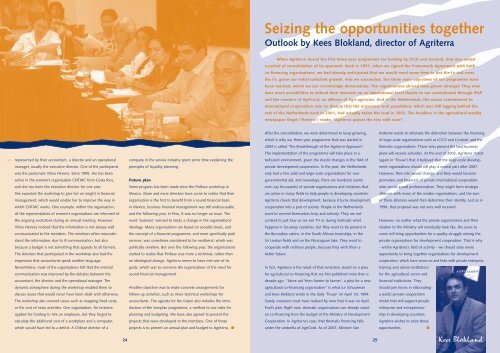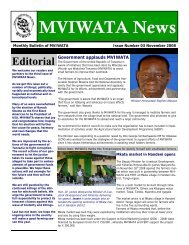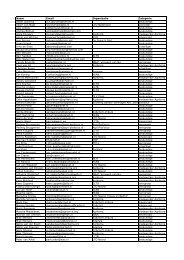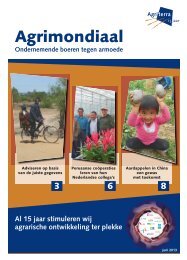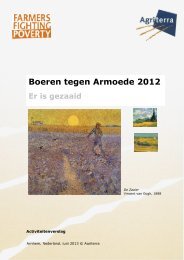télécharger - Agriterra
télécharger - Agriterra
télécharger - Agriterra
You also want an ePaper? Increase the reach of your titles
YUMPU automatically turns print PDFs into web optimized ePapers that Google loves.
Seizing the opportunities togetherOutlook by Kees Blokland, director of <strong>Agriterra</strong>When <strong>Agriterra</strong> closed the first three-year programme for funding by ICCO and Cordaid, that also endeda period of consolidation of its approach. Back in 1997, when we signed the Framework Agreement with bothco-financing organisations, we had already anticipated that we would need some time to dot the i’s and crossthe t’s, given our initial turbulent growth. And we succeeded. The three main objectives of our programme havebeen reached, which we can convincingly demonstrate. The organisations abroad have grown stronger. They nowhave more possibilities to defend their interests on an international level thanks to our commitment through IFAPand the creation of AgriCord, an alliance of Agri-agencies. And in the Netherlands, the actual commitment tointernational cooperation rose so sharply that the organised rural population, which was still lagging behind therest of the Netherlands back in 2001, had actually taken the lead in 2003. The headline in the agricultural weeklynewspaper Oogst (‘Harvest’) reads: "<strong>Agriterra</strong> passes the test with ease".After the consolidation, we were determined to keep growing,Ardenne wants to eliminate the distinction between the financingwhich is why our three-year programme that was started inof large-scale organisations such as ICCO and Cordaid, and the2004 is called ‘The Breakthrough of the <strong>Agriterra</strong> Approach’.thematic organisations. Those who present the best businessThe implementation of the programme will take place in aplans will receive subsidies. At the end of 2003, <strong>Agriterra</strong> stated>>represented by their accountant, a director and an operationalcompany in the service industry spent some time explaining theturbulent environment, given the drastic changes in the field of(again in ‘Trouw’) that it believed that the large-scale develop-manager, usually the executive director. One of the participantsprinciples of liquidity planning.private development cooperation. In the past, the Netherlandsment organisations should still play a central part after 2007.was the passionate Vilma Herrera. Since 1995, she has beenonly had a few solid and large-scale organisations for non-However, their role would change, and they would becomeactive in the women’s organisation CNTMC from Costa Rica,Future plangovernmental aid, and nowadays, there are hundreds (somepromoters and financers of private international cooperation,and she has been the executive director for one year.Some progress has been made since the FinBase workshop ineven say thousands) of private organisations and initiatives thatwho would guard professionalism. They might form strategicShe expected the workshop to give her an insight in financialMexico. More and more directors have come to realise that theirare active in many fields to help people in developing countries.alliances with many of the smaller organisations, and the summanagement, which would enable her to improve the way inorganisation is the first to benefit from a sound financial basis.<strong>Agriterra</strong> cheers that development, because it turns developmentof those alliances would then determine their identity. Just as inwhich CNTMC works. One example: within the organisation,In Mexico, business financial management was still undiscussable,cooperation into a part of society. People in the Netherlands1994, that proposal was not very well received.all the representatives of women’s organisations are informed ofand the following year, in Peru, it was no longer an issue. Thewant to commit themselves truly and actively. They are notthe ongoing evolutions during an annual meeting. However,word ‘business’ seemed to imply a change in the organisations’content to just hear or see (on TV or during festivals) whatHowever, no matter what the private organisations and theirVilma Herrera noticed that the information is not always wellideology. Many organisations are based on socialist ideals, andhappens in far-away countries, but they want to be present inrelation to the Ministry will eventually look like, the years tocommunicated to the members. The members often misunder-the concept of a financial programme, and more specifically paidthe Burundian cabins, in the South African townships, in thecome will bring opportunities for a quality struggle among thestand the information, due to ill communication, but alsoservices, was sometimes considered to be neoliberal, which wasSri Lankan fields and on the Nicaraguan lake. They want toprivate organisations for development cooperation. That is whybecause a budget is not something that appeals to all farmers.politically sensitive. But over the following year, the organisationscooperate with ordinary people, because they wish them a- within <strong>Agriterra</strong>’s field of activity - we should seize everyThe directors that participated in the workshop also had thestarted to realise that FinBase was more a technical, rather thanbetter future.opportunity to bring together organisations for developmentimpression that accountants speak another language.an ideological change. <strong>Agriterra</strong> seems to have met one of itscooperation, which have views on and links with private enterprise,Nevertheless, most of the organisations felt that the internalgoals, which was to convince the organisations of the need forIn fact, <strong>Agriterra</strong> is the result of that evolution, based on a pleatraining and advice institutionscommunication was improved by the debates between thesound financial management.for agricultural co-financing that we first published more than afor the agricultural sector andaccountant, the director and the operational manager. Thedecade ago. "More aid ‘from farmer to farmer’, a plea for a newfinancial institutions. Theydynamic atmosphere during the workshop enabled them toAnother objective was to make concrete arrangements foragricultural co-financing organisation" is what Jur Schuurmanshould join forces in elaboratingdiscuss issues that would never have been dealt with otherwise.follow-up activities, such as more technical workshops forand Kees Blokland wrote in the daily ‘Trouw’ on April 1st, 1994.a public-private cooperationThe workshop also covered issues such as mapping fixed costs,accountants. The agenda for the future also includes the intro-Surely, everyone must have realised by now that it was no Aprilmodel that will support privateor the cost of extra activities. One organisation, for instance,duction of the Somplan programme, a method to use rates forFool’s joke. Right now, thematic organisations can already countenterprise and entrepreneur-applied for funding to hire an employee, but they forgot toplanning and budgeting. We have also agreed to present theon co-financing from the budget of the Ministry of Developmentship in developing countries.calculate the additional cost of a workplace and a computer,projects that were developed to the members. One of thoseCooperation. In <strong>Agriterra</strong>’s case, that thematic financing falls<strong>Agriterra</strong> wishes to seize thosewhich would have led to a deficit. A Chilean director of aprojects is to present an annual plan and budget to <strong>Agriterra</strong>. ■under the umbrella of AgriCord. As of 2007, Minister Vanopportunities.■2425 Kees Blokland


